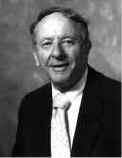|

|
Commentary
by Dr. Gerhard Falk |
John
von Neumann
Although
Jews constitute only 1.8% of all Americans, more than 50% of all members of the
division of mathematics and applied mathematical sciences of the U.S. Academy of
Science are Jewish. Furthermore, 61% of all winners of the lifetime achievement
award in mathematics are Jewish. Additional evidence for Jewish accomplishments
in mathematics is easily found. For example, the winners of 41% of the Wolf
Prize in Mathematics are Jews; 42% of the winners of the Bocher Memorial Prize
in mathematics are Jews and 44% of the winners of the Frank Nelson Cole Prize in
Algebra and Numbers theory are Jews.
The number
and contributions of Jewish mathematicians is so great and so long that they
cannot be reproduced here. Therefore I will introduce you to only one very
important Jewish mathematician because his life and attitude towards Judaism are
typical of almost all Jewish scientists. This does not mean that his
contributions to mathematics are not unique.
John von
Neumann was a major contributor to quantum mechanics. Quantum mechanics
developed gradually from the works of Rutherford, Einstein and others but was
finalized and placed on a solid foundation by Heisenberg in 1925. Heisenberg
(not Jewish. A German Nazi) is also known as the mathematician who developed the
“uncertainty principle”.
Von
Neumann is credited with developing the mathematical framework of the theory. In
1929 von Neumann wrote a paper dealing with self-adjoint algebras of bounded
linear operators on a Hilbert space. Von Neumann called these developments
“rings of operators” but his colleagues called them “von Neumann
algebras”. This work and his understanding of the work of the mathematician
Borel led von Neumann to the creation of game theory, which proved the minimax
theorum and led to his collaboration with Morgenstern (also Jewish) in writing
the fundamental text known to all economics students and called Theory of
Games and Economic Behaviour (published in England).
In 1938
von Neumann was awarded the Bocher prize for his study of periodic functions.
Thereafter he turned to a study of hydrodynamical turbulence which in turn led
to his study of non-linear partial differential equations. This in turn caused
him to study electronic machines so that he became one of the pioneers of
computer science. Von Neumann contributed to “automata theory” and then
became involved in a mixture of pure and applied mathematics. He invented the
theory of cellular automata and created the idea of a bit as a measurement of
computer memory.
During the
second World War von Neumann was instrumental in proposing implosion as a method
of bringing nuclear fuel to explosion and thereafter contributed to the
development of the hydrogen bomb.
The
achievements of von Neumann are of course far greater than what can be presented
here.
He was
born in Budapest, Hungary in 1903 and died in Washington D.C. in 1957. His
father was a wealthy banker who gave Janos an extended education in languages
and science. Although his father was by no means a member of any nobility, he
bought the title “von”, yet never used it. It was his son, now known as
John, who used it throughout his life in an effort to pretend German ancestry
when in fact he was a Hungarian Jew.
No one in
his family ever practiced Judaism. Nevertheless, his family became the targets
of Hungarian Jew haters after the Hungarian government was overthrown by a
Jewish communist in 1919. That communist government only lasted five months, but
all Jews were blamed because the leader of the communist party was a Jew named
Kuhn.
Thereafter,
von Neumann studied at several Hungarian and German universities and received a
Ph.D. in mathematics from the University of Budapest in 1926 after also
graduating from the University of Zurich in Chemical Engineering in that same
year, 1926.
In 1929
von Neumann was invited to become a member of the Princeton faculty and
therefore escaped the Nazi persecutions soon to follow.
He died
when he was only 54 years old. He received so many honors and distinctions that
even one feature of the moon is named “von Neumann crater”.
There are
many Jewish scientists in America and elsewhere who are utterly unconnected to
the Jewish community, as was von Neumann. I counted the number of Jews or
pseudo-Jews who became famous in science over the past 100 years and found that
only Albert Einstein identified himself with the Jewish people, although he too
had no affiliation with any Jewish organization or congregation. Like almost all
scientists, Einstein was a deist. He had no religion but believed that Shem
Yisborach exists, as he repeatedly wrote that “God does not play dice with the
universe.”
If this
has aroused in interest in you in the history of mathematics, why not read Eric
Bell’s book Men of Mathematics.
Shalom u’vracha.
Dr. Gerhard Falk is the author of numerous publications,
including Grandparents:
A New Look at the Supporting Generation (with Dr. Ursula A., Falk, 2002),
& Man's
Ascent to Reason (2003).
| 